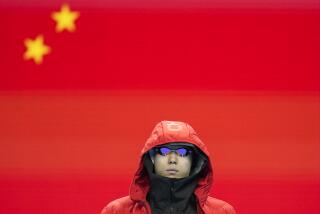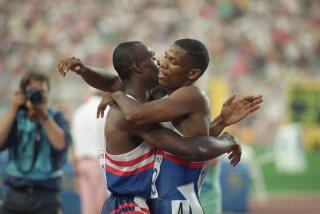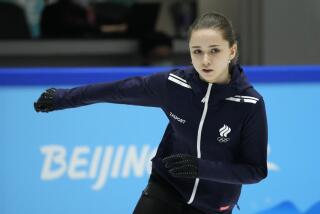IOC Opens Sprinter Inquiry
The International Olympic Committee on Tuesday opened “disciplinary proceedings” involving U.S. sprinter Jerome Young’s positive 1999 test for a banned steroid, a move that intensified prospects that the U.S. men’s 1,600-meter team could be stripped of the gold medals it won at the 2000 Sydney Olympics.
The IOC took the action after confirmation by the U.S. Olympic Committee on Thursday that Young had tested positive in 1999 for the steroid nandrolone. A USA Track & Field hearing board initially found that Young had committed a doping violation, but a USATF appeals board, acting just days before the 2000 Olympic trials, cleared Young to compete.
Young ran in the opening and semifinal rounds of the 1,600-meter relay in Sydney. He and five others were awarded medals when the U.S. team breezed to victory in the final.
Track and Olympic officials had known for years that a U.S. athlete had run in the Sydney Games after testing positive, but USATF declined to release the name. The Times on Aug. 27 identified the athlete as Young.
The action Tuesday underscored IOC President Jacques Rogge’s aggressive position in the case.
Rogge organized a worldwide telephone conference call of the IOC’s ruling executive board -- only five days after it had concluded meetings in Lausanne, Switzerland -- solely to “move the issue forward and find the reason for Jerome Young’s exoneration.”
The IOC then appointed a special disciplinary commission, consisting of two IOC delegates, Thomas Bach of Germany and Denis Oswald of Switzerland, both lawyers. They are to be assisted by the IOC’s director general, Francois Carrard, also a lawyer.
The panel is to submit any report or recommendation to the executive board. The IOC, in a statement, made a point of noting that the board had the power to consider “all possible consequences,” including the stripping of the medals.
No time frame was given. The executive board’s next meeting is in December at IOC headquarters in Lausanne.
Dick Pound, president of the World Anti-Doping Agency, commenting on the case Tuesday, said that a joint IOC-WADA inquiry had reviewed the USATF appeal board’s ruling and “cannot understand how ... any authority could have reached the conclusion that there was no doping offense.”
Young tested negative for banned substances at meets June 12 and July 2, 1999. In between, on June 26, he tested positive for nandrolone.
The USATF appeal board, in its ruling, said that the negative test, six days after the positive test, created “reasonable doubt.”
Pound said Tuesday, “That’s like saying, ‘It was sunshiny on Monday and sunshiny on Wednesday, therefore, it couldn’t possibly have rained on Tuesday.’ You can’t be serious.”
The USOC said it could find “no explanation” in its files to support USATF’s move to clear Young to compete.
More to Read
Go beyond the scoreboard
Get the latest on L.A.'s teams in the daily Sports Report newsletter.
You may occasionally receive promotional content from the Los Angeles Times.






